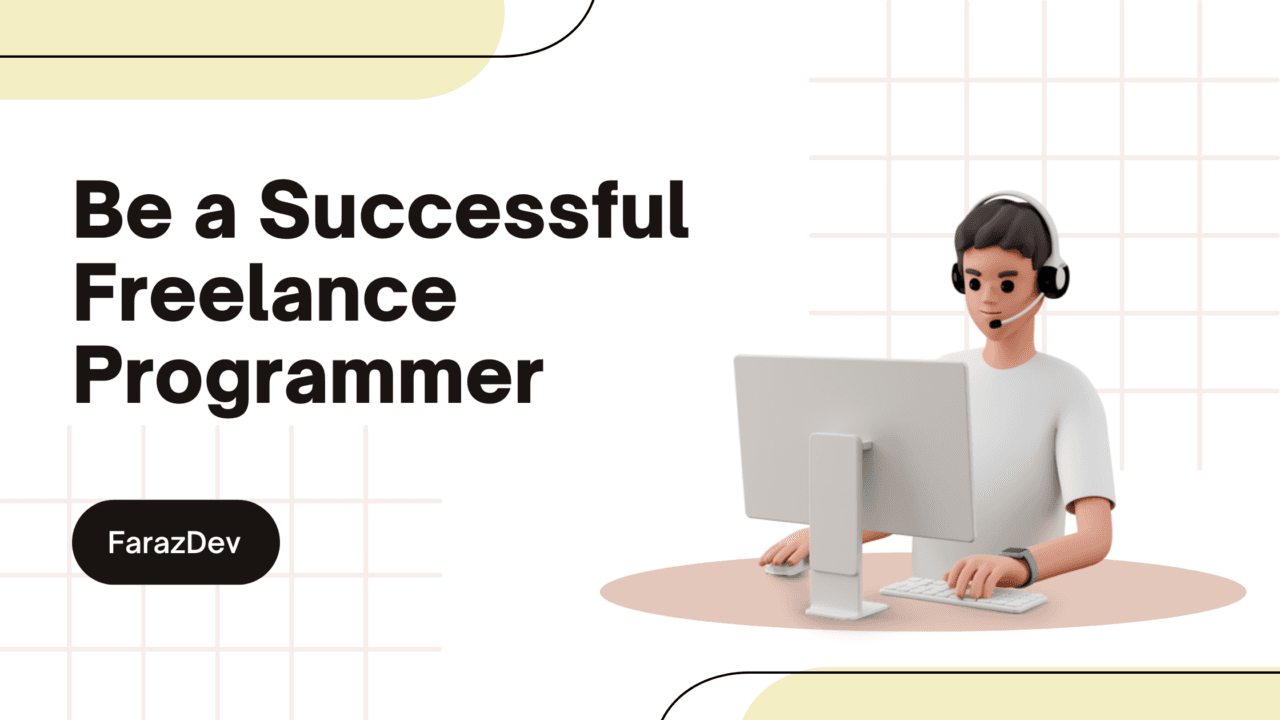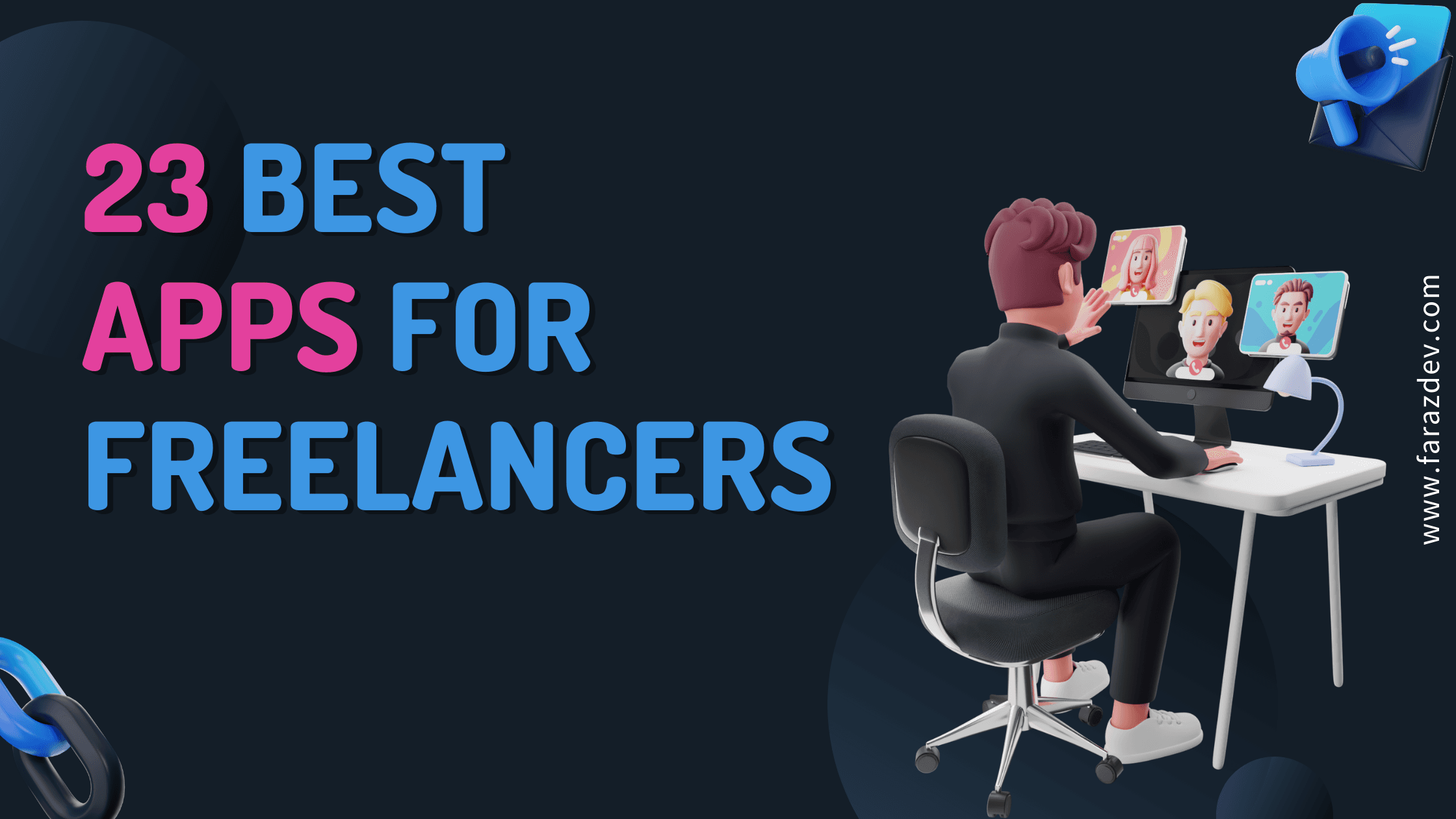Freelancing has become a popular and lucrative side hustle in today’s world. Many people even choose to make it their full-time business. As an experienced freelance programmer, I can attest to the wide range of skills and opportunities available in this field that will give answer for your question: How to be Successful in Freelancing as a Programmer?
Programming is a vast and ever-evolving skill that offers numerous languages to master and attract potential clients. The allure of attractive salaries is often what draws people to learn programming. However, what if I told you that you can achieve the same level of income while working from the comfort of your own home, in front of your laptop?
Interestingly, you don’t need a degree in programming to succeed as a freelancer. In fact, a significant 27% of programmers don’t possess any formal education in the field, according to this source. The key to success lies in your skills, experience, and ability to deliver high-quality work.
In this article, I will share my firsthand experience and insights on how you can thrive as a freelance programmer. So, without further ado, let’s dive right into it!
Programming, Simplified
Programming, in the simplest terms, is a process of instructing a computer to perform specific tasks. It involves writing, testing, debugging, and maintaining the source code of computer programs. This code, written in various programming languages, serves as a blueprint, guiding the computer to execute tasks – from the simplest function of addition to the complex operations running behind sophisticated software applications.
Types of Programming
There are several types of programming, each with its unique attributes and functions.
Front-End Programming:
This type of programming deals with the parts of the website or application users interact with. Languages commonly used include HTML, CSS, and JavaScript.
Back-End Programming:
This involves developing server-side systems, which include databases and scripts for website functionality. Common languages used include PHP, Python, and Java.
Full Stack Programming:
Full-stack programmers have the skills to work on both front-end and back-end development.
Mobile Application Programming:
Involves developing applications for mobile devices. Java and Swift are popular languages in this realm.
Game Development:
This is about creating entertaining user experiences. Languages like C++ and Unity are often used.
Data Science Programming:
This involves extracting, analyzing, and interpreting complex data. Python and R are heavily used in this field.
Each type offers unique opportunities for freelancing programmers, allowing them to carve out their niche based on their interests and expertise.
Who is a programmer?
A programmer, also known as a software developer or coder, is a professional who designs and creates computer software. They use mathematical algorithms and programming languages to instruct computers on how to perform tasks. Programmers work in a variety of settings, including corporations, government agencies, or as freelancers, developing everything from operating systems and databases to video games and mobile applications. Their skills are essential in today’s digital era, enabling the functionality that drives our technological world.

Photo by Max Duzij from Unsplash
Being a freelance programmer offers numerous advantages. You have the freedom to choose your clients, work at your preferred times, set your own hourly rates, and handle your taxes independently. Additionally, you can leverage various freelance platforms to showcase and sell your services.
In-demand skills for freelance programmers include:
- Game and mobile development
- Blockchain
- Cybersecurity
- Data science
- AI and machine learning
Why are there so many programming languages?
There are many programming languages today because the software industry has different needs that keep changing. Each language is made for specific tasks, so they are good at handling different things. For example, Python is easy to learn and great for beginners and data science. C++ gives you more control over hardware and is good for making games. HTML and CSS are for making websites look nice. As technology keeps advancing, new languages are made to solve new problems. Having so many languages means developers can pick the right one for the job. What is the Purpose of a Freelance Programmer?
How much can you make as a freelance programmer?
Your income as a freelancer depends upon the level of your expertise, portfolio, and type of client you target. there is no limit, If you target high-ticket clients you can make 6 figures.
As a freelance web developer, the earning potential is truly immense. Personally, I have managed to reach the $100,000 per year mark within few years. It’s a testament to the lucrative nature of freelance web development, given the right combination of skills, experience, and market demand.
I started off with modest earnings, but as I expanded my skill set and built a robust portfolio, I could command higher rates for my services. Key to this progression were specializations in JavaScript, React and related technologies, which are highly sought after in the industry. I also tapped into emerging technologies like responsive design and blockchain to stay ahead of the curve.
The average freelance developer makes around $60, according to Careerkarma. Moreover, the DevOps developers make $60 to $120 per hour on Upwork.
However, it’s worth noting that this income level didn’t come easy. It required countless hours of self-learning, networking, and delivering consistently high-quality work to clients. To reach this income level, being business-savvy is as important as technical proficiency. For instance, learning how to negotiate contracts, manage time effectively, and maintain good client relationships played crucial roles in my financial success as a freelancer.
Remember, as a freelance programmer, your income isn’t just about the raw coding hours. It also encompasses the value you bring to your clients through problem-solving, innovative thinking, and delivering solutions that drive their business forward.
Also Read: How Much Freelance Programmers make
How to be Successful in Freelancing as a Programmer?
Let’s discuss the following tips to be successful in freelancing as a programmer:
1. Becoming a Professional
In today’s highly competitive world, it is crucial to equip yourself with the necessary skills to stand out from the crowd. While coding skills are undoubtedly important, they are not the sole determining factor for success. Let’s delve into some key aspects:
- Enroll in Relevant Courses: You don’t necessarily need a degree to excel as a freelance programmer. Numerous online courses are available that can provide you with valuable knowledge and expertise.
- Build a Testimonial Portfolio: Upwork and Fiverr clients often rely on testimonials and reviews when hiring freelancers. Therefore, it is essential to gather testimonials that showcase your experience, helping clients trust you with their projects.
2. Master one Programming language

Mastering one programming language is like having a powerful tool. As a Top rated Web developer freelancer specializing in React development, I can tell you that having deep expertise in a single language can really take your freelancing career to the next level. By mastering React, not only was I able to provide high-quality and efficient solutions, but I could also better explain the unique benefits of React to potential clients, which helped me win more projects.
Being an expert in one language allows you to stay up-to-date with its evolving ecosystem, which is incredibly valuable in the fast-paced world of technology. In my case, staying on top of React’s advancements and updates allowed me to continuously improve my services and stay competitive.
Specializing in one language also helps you build a strong personal brand. Clients started recognizing me as a ‘React Specialist’, and this niche reputation brought me more targeted job opportunities. Mastering a language not only improves your coding skills but also enhances your communication with clients, problem-solving abilities, and overall workflow efficiency.
3. Work Locally and Gain Experience
Becoming proficient in a specific programming field is crucial. Clients often seek specialization and expertise. Therefore, it is important to continuously learn and practice new concepts to stay updated.
In the beginning stages of freelancing, it is advisable to focus on open-source projects. This will provide valuable work experience, even if it may not bring substantial financial rewards. However, as you gain more experience in this field, the possibilities become limitless. You can start by finding clients through local Facebook groups and offer your services to them. This approach will not only help you refine your skills but also establish a strong foundation for future opportunities.
4. Create a Professional Portfolio
A polished and professional portfolio is crucial for freelancers in the programming field. Your portfolio should include your contact information, relevant experience, and samples of your work. Additionally, consider adding links to your social media accounts, such as LinkedIn, Facebook, and Instagram, to facilitate easy client communication. To ensure maximum visibility on search engines like Google, employ effective SEO strategies for your portfolio website.
Lastly, it is important to refrain from sharing copyrighted work from past clients. Doing so may undermine the trust potential clients place in you.
5. Importance of Communication skills for freelancers
Effective communication is a crucial skill for freelancers to master. It not only allows you to better understand your clients but also enhances client satisfaction and fosters strong relationships, paving the way for long-term collaboration.7. Practice
As a solo freelancer, physical meetings may not always be possible. However, you can bridge this gap by staying responsive and maintaining daily communication with your clients. Regularly address their concerns, provide clarifications, and offer detailed insights into your work strategy.
Moreover, demonstrating genuine interest in your clients’ projects and showcasing your problem-solving abilities will set you apart. Clearly articulate how you will approach and resolve challenges, assuring your clients of your competence and dedication.
Remember, effective communication is the key to success as a freelancer, enabling you to establish trust, deliver exceptional work, and cultivate lasting professional connections.
“Practice makes perfect” – Bruce Lee; we all have heard this quote. Well, practicing your coding regularly will make you efficient and worthy. Moreover, there are times when freelancers often don’t get projects.
As mentioned above, you can take courses and watch YouTube videos about the latest programming language updates.
6. Build your networks
Leveraging social media platforms to build your personal brand can be instrumental in attracting potential clients. LinkedIn and Facebook, in particular, offer exceptional opportunities to showcase your brand and promote your services to a wider audience.
Additionally, creating a blog or website can serve as an effective marketing tool, complemented by running targeted ads on Facebook. On LinkedIn, it’s valuable to connect with individuals across diverse professional categories. It’s worth noting that LinkedIn boasts a community of over 2.4 million freelancers actively engaged in their respective fields.
Also Read: Ways on How to Make Money Marketing with Social Media
7. Satisfy your clients
As a solo freelancer, satisfying your clients is crucial. To receive good reviews, you must impress them with your work. Let’s explore how you can achieve this:10. Make yourself standout
- Meeting Deadlines: Delivering work before the deadline is essential. Failure to do so will leave the client dissatisfied.
- Clearing Doubts: Don’t hesitate to ask clients questions about the projects. This will help clarify any uncertainties and ensure that you submit high-quality work.
- Attentiveness: Pay close attention to your client’s needs and feedback regarding the project. This will not only improve your current work but also enhance future projects.
By following these guidelines, you can excel as a freelancer and cultivate strong client relationships.
You’ll need to stand out in the market to compete with other freelancers. Work on your skillset and fulfill your client’s needs. Ask them for reviews about your work; it will help you navigate your deficiencies, which can be improved later.
11. Reliable Freelancing Platforms
Finally, it’s time to determine which platform you’ll use to offer your services to clients. There are various freelance platforms available on the internet. Let’s explore them.
Upwork
Upwork is currently one of the most sought-after and popular freelance platforms. Programmers are earning $60-70 per hour on this platform.
Fiverr
Fiverr is a reliable alternative to Upwork, with different policies in place. On Fiverr, you’ll need to create gigs showcasing your services, allowing clients to place orders based on your gig descriptions. Currently, there are more than 830,000 freelancers actively working on Fiverr.
Related: Why Fiverr is not a Good Platform to Start a Freelance Career?
Conclusion
In conclusion, freelancing as a programmer is a challenging yet rewarding path. It demands perseverance, ongoing learning, and consistent practice. By following the tips and exploring the income opportunities discussed, solo programmers can navigate the world of freelancing with confidence. Remember to prioritize key areas for success and choose a reliable freelance platform like Upwork or Fiverr. Embrace the journey, and may your freelance career soar to new heights!




